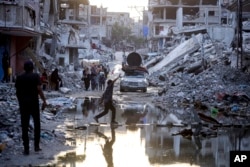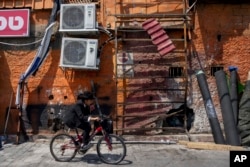U.S. Secretary of State Antony Blinken said in Tel Aviv late Monday that Israeli Prime Minister Benjamin Netanyahu had accepted an American “bridging proposal” on a Gaza cease-fire deal, and that it was now up to Hamas to agree.
Meanwhile, a polio vaccination campaign in Gaza is expected to move forward as planned in late August and September, regardless of the outcome of the latest cease-fire negotiations.
“It’s now incumbent on Hamas to do the same,” and then with the help of mediators Egypt, Qatar and the United States, to “come together and complete the process,” Blinken told reporters, without saying whether concerns cited by the Hamas militant group had been addressed.
Blinken’s ninth visit to the Middle East since the Gaza war broke out in October 2023 came as the U.S., Egypt and Qatar sought to finalize a cease-fire and hostage-release deal between Israel and Hamas.
WATCH: Eyes on Hamas after Israel confirms support for proposal
The U.S. put forward a bridging proposal during last week’s cease-fire talks in Doha. Negotiations are set to resume in Cairo this week.
“We’re never giving up,” said Blinken, when asked if time to take the deal could ultimately run out. He held a one-on-one meeting with Netanyahu for 2½ hours.
Some analysts were skeptical.
“I think there’s a lot of wishful thinking going on, and I think the wishful thinking is because the stakes are now so high, because there is a potential for this conflict to escalate beyond its borders,” Mirette Mabrouk, a senior fellow at the Middle East Institute, told VOA on Monday.
An Israeli government spokesperson told reporters on Monday that Netanyahu “stands firmly by the principle” that the Israel Defense Forces will maintain a physical presence in the Philadelphi Corridor — the border between Gaza Strip and Egypt — to prevent what they describe as the resupply of Hamas’ deadly weapons.
Earlier, Hamas accused Netanyahu of undermining the mediators’ efforts. Sami Abu Zuhri, a member of Hamas’ political bureau, dismissed claims that signs of progress after two days of talks in Doha were “an illusion.”
There is an increased urgency to reach a deal amid fears of broader regional escalation if Iran and its Lebanese proxy, Hezbollah, retaliate against Israel for the assassination of a top Hezbollah operative in Beirut and Hamas political leader Ismail Haniyeh in Tehran.
Israel has claimed responsibility for the Beirut attack but not the Tehran one, although it is widely presumed to have carried it out.
Blinken will head to Egypt and Qatar later this week to hold talks with Egyptian President Abdel-Fattah el-Sissi, as well as the emir of Qatar, Sheikh Tamim bin Hamad Al Thani.
Polio threat
A planned polio vaccination campaign in Gaza is set to proceed later this month amid the growing threat of a reemergence of the virus.
“We’ve been working on a detailed plan to make sure that those who need to be vaccinated against it can get vaccinated,” Blinken said after meeting with Israeli Defense Minister Yoav Gallant on Monday.
The Israeli military agency responsible for Palestinian civilian affairs, known by its acronym COGAT, said it would continue to facilitate the entry of medical teams and vaccines against the polio virus.
COGAT said that since the beginning of the war, 282,126 vials of the polio vaccine, sufficient for 2,821,260 doses, have been sent to Gaza. In the coming weeks, an additional 60,000 vaccines will be delivered to vaccinate more than 1 million children.
The World Health Organization and UNICEF, the United Nations’ children’s agency, have called for a seven-day humanitarian pause in the conflict to allow for two rounds of vaccination campaigns planned for late August and September across the Gaza Strip.
Hamas said in a statement last Friday that it would support a seven-day truce to facilitate the vaccinations. This was separate from the latest American cease-fire proposal and separate from a permanent cease-fire that Hamas has demanded.
Polio was eliminated in Gaza 25 years ago. However, in July 2024, the poliovirus was detected in environmental samples from Khan Younis and Deir al-Balah, located in the south and center of Gaza. According to WHO, three children presenting with suspected symptoms of polio have since been reported in Gaza.
“Completing a successful polio vaccination campaign is quite challenging. The safe transport of vaccines in cold temperatures and the availability of fuel and communication networks are all essential for the success of the WHO/UNICEF-led campaign to vaccinate 650,000 children below the age of 8 years,” Zaher Sahloul, president of humanitarian group MedGlobal, told VOA.
“A cease-fire, or at the very least a humanitarian pause, is urgently needed to give this polio vaccination campaign a fighting chance,” said Sahloul, who added that MedGlobal’s clinics in Gaza were expected to participate in the polio vaccination campaign.
Violence continues
Shortly after Blinken arrived in Israel on Sunday, a bomb exploded near a synagogue in Tel Aviv, killing the person carrying it and injuring a passerby, Israeli police said. On Monday, police described the bombing as a terror attack.
Also on Monday, Israel continued advances north of Khan Younis and stepped up its bombardment of Gaza City suburbs overnight, Reuters news service reported.
Lebanon’s Health Ministry said an Israeli strike killed two people in south Lebanon, and Lebanon’s official National News Agency reported Israeli shelling and raids in several areas.
Hezbollah announced it had launched a “simultaneous air attack” with “explosive-laden drones” on two Israeli military positions: a barracks near the border and a base near the coastal town of Acre.
VOA’s Natasha Mozgovaya and Kim Lewis contributed to this report. Some information came from The Associated Press, Agence France-Presse and Reuters.




